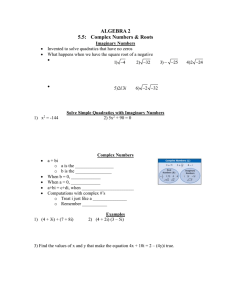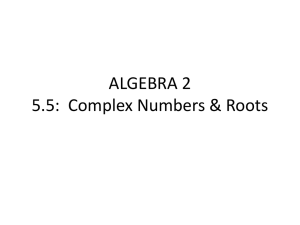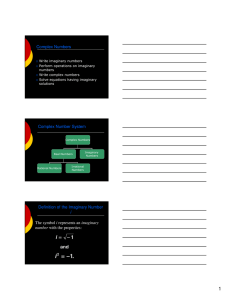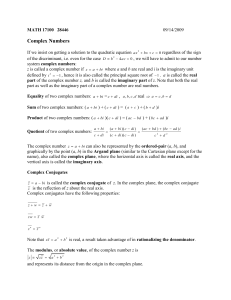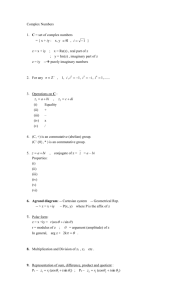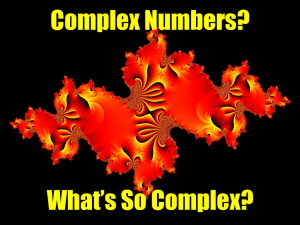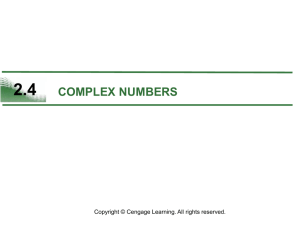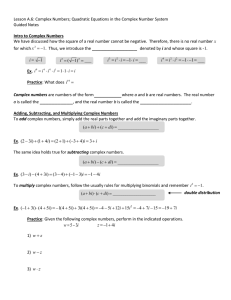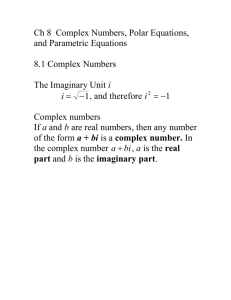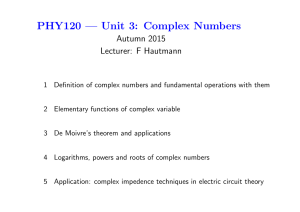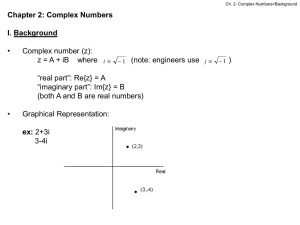Numeri Complessi: Introduzione, Algebra e Applicazioni
advertisement
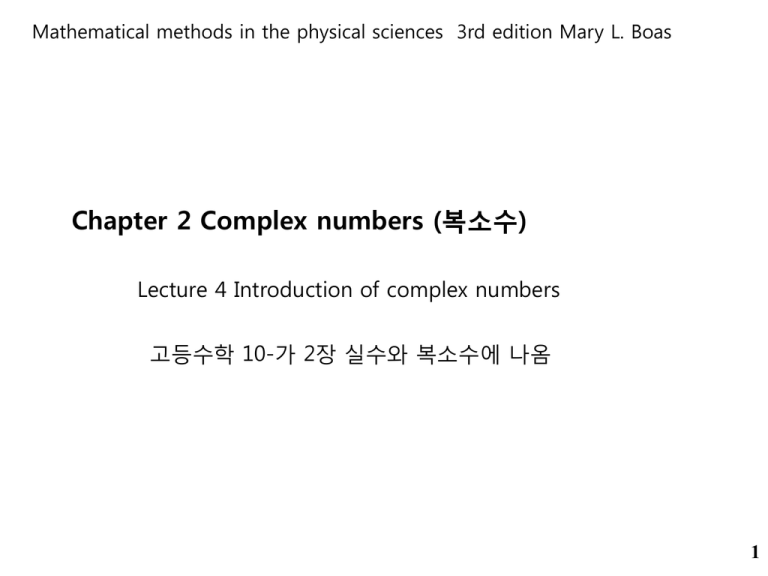
Mathematical methods in the physical sciences 3rd edition Mary L. Boas Chapter 2 Complex numbers (복소수) Lecture 4 Introduction of complex numbers 고등수학 10-가 2장 실수와 복소수에 나옴 1 1. Introduction az bz c 0 2 z b b 4 ac 2 ' b 4 ac ' can be negative. 2 , sometimes, 2a Let' s consider i 1, 2 ex. imaginary ex ) 2 number i 8 i 2 i 8 i 1 2 16 4 . z 2z 2 0 2 z 2 48 2 2 4 1 i. 2 2 (READING) Once the new kind of number is admitted into our number system, fascinating possibilities open up. Can we attach any meaning to marks like sin i, e^i, ln (1+i)? We’ll see later that we can and that, in fact, such expressions may turn up in problems in physics, chemistry, and engineering, as well as, mathematics. When people first considered taking square roots of negative numbers, they felt very uneasy about the problem. They thought that such numbers could not have any meaning or any connection with reality (hence the term “imaginary”). They certainly would not have believed that the new numbers could be of any practical use. Yet complex numbers are of good importance in a variety of applied fields; for example, the electrical engineer would, to say the least, be severely handicapped without them. The complex notation often simplifies setting up and solving vibration problems in either dynamical or electrical systems, and is useful in solving many differential equations which arise from problems in various branches of physics. 3 2. Real and imaginary parts of a complex number (복소수의 실수와 허수 부분) z x iy x: real part y: imaginary part (not imaginary!!) 4 3. Complex plane (복소수 평면) - Complex plane: similar to the xy plane 5 -Rectangular form (x,y) vs. Polar form (r,) (직교형태 VS 극좌표 형태) x r cos , y r sin r x y , tan 2 2 y . x z x iy r cos ir sin r cos i sin re i (polar form). 6 Example) cf. : radian 7 4. Terminology and notation Absolute (or modulus) real part : Re z x imaginary part : Im z y angle of z : ex) value z r, z 1 i principal angle 8 - Complex conjugate (켤레 복소수) complex conjugate z z * x iy x iy . z r cos i sin r cos i sin re i . 9 5. Complex algebra (복소수 연산) A. Simplifying to x+iy form ex1. ex2. 1 i 2 1 i 1 i 1 2 i i 1 2 i 1 2 i . 2i 2 i 3 i 3 i 3 i 3i ex3. (polar 2 form) 1 i 2 6 3i 2 i i 9i 2 i / 4 2e 2 2 5 5i 10 2e i / 2 1 2 1 i 2 2 i. squaring ex4. 1 2 cos 20 i sin 20 1 2e i 20 1 2 e i 20 1 2 cos 20 i sin 20 10 B. Complex conjugate z1 z 2 z1 z 2 , z f ig z f i g ( not f ig ) note) We can get the conjugate of an expression containing i’s by just changing the signs of all the i terms. z 2 3i i4 z 2 3i i4 . C. Absolute value i z re , z re i , zz r e 2 i i r z 2 2 z zz . 11 D. Complex equations x iy 2 2i, x2 y2 0 2 2 x 2 ixy y 2 i x y 1. 2 xy 2 12 E. Graphs ex.1 z 3, z x iy , ex2. ex3. tan x y 9 2 2 x 1 2 y 2 9 2 z 1 9, Angle x iy 3 , y x of z : / 4 y 1 y x x ex.4 Re z x 1 2 1 2 13 Mathematical methods in the physical sciences 3rd edition Mary L. Boas Chapter 2 Complex numbers Lecture 5 Euler formula & roots and powers 6. Complex infinite series (복소수 무한 급수) S n X n iY n lim S n S X iY , where n lim X n X , n lim Y n Y . n In this case, we call the complex series convergent. 7. Complex power series; Disk of convergence (복소수 멱급수 ; 수렴 원판) a n n z , ex. 1 z z a n : complex 2 2 For absolute z 3 3 z numbers 4 4 convergenc e, lim n zn n 1 z 1. cf. real vs. complex 2.8 Elementary function of complex numbers (복소수 기본함수) - elementary functions: powers, roots, trigonometric, inverse trigonometric, logarithmic, exponential, and combinations of these. - Elementary functions of complex numbers behave just like those of real numbers i ) f z z 2 z 1, f 1 i 1 i 2 1 i 1 1 2 2 ii ) e 1 z z z 2 2! z iii ) e 1 e z2 e z1 z 2 z 3 3! 2.9 Euler’s formula sin 3 3! e i 1 i 5 5! i 2 2 2! 2 2! i 3 2! 1 i cos 1 , i 3! 3 3! i 4 4 4! i 4! i 5 4! 4 5! 5 5! 2 4 3 5 1 i cos i sin 2! 4! 3! 5! e i cos i sin Euler' s fomula z x iy r cos i sin re i Ex. Find the graph expressing a given z. 2e i / 6 i , e , 3e i / 2 , e 2 n i - Multiplication, division z1 z 2 r1 e z1 z 2 i 1 r1 e r2 e i 2 i 1 2 i / 4 r1 r2 e i 1 2 , . r2 2 1 i ex. 1 i 1 i 1 i 2 2e 2e i / 4 2 2e i / 2 2e i / 4 2e 3 i / 4 . 10. Powers and roots of complex numbers (복소수의 멱수와 근) e i cos i sin n e i 1 / n cos i sin z re n n i n r e n in , cos n i sin n cos i sin . n n 1 / n z 1/ n re i 1 / n r 1/ n e i / n ex.1 cos / 10 i sin / 10 e i / 10 e 2 i e i / 2 i. 25 25 ex.2 Cube roots of 8? 8 8 i 0 8e k 0, k 1, k 2, 2 k i 3 8 8e 2 k i 1 / 3 z 2 z 2e i z 2e 2 3 i 4 3 1 3 . 2 i 2 2 1 3 2 i 2 2 8 1/ 3 i e 2 k 3 . ex.3 Find the plot all values of r 1/ 4 4 64 1/ 4 64 2 2 2 k 4 4 3 5 7 , 4 , 4 , 4 4 . ex. 4 r 6 1/ 6 6 8 8i 1/ 6 2 2 k 3 / 2 6 4 3 k ( 0 ,1, 2 , 3 , 4 , 5 ). Mathematical methods in the physical sciences 3rd edition Mary L. Boas Chapter 2 Complex numbers Lecture 6 application 11. The exponential and trigonometric functions (지수함수와 삼각함수) - exponential function e e z ex. e x iy 2 i e e x e e 2 e cos y i sin y iy x e 1 e . i 2 2 - trigonometric function e i cos i sin , sin e i e e i cos i sin i cos , 2i sin z i e i . 2 e e iz Similarly, e 2i iz e e iz , cos z 2 iz . 12. Hyperbolic functions (쌍곡함수) e e z sinh z z e e z , cosh z 2 z 2 - The other hyperbolic functions are named and defined in a similar way to parallel the trigonometric functions: tanh z sinh z cosh z sec h z 1 1 coth z , tanh z , 1 csc h z . cosh z sinh z sin iy i sinh y , cos iy cosh y . cosh d dz 2 z sinh 2 z 1, cosh z sinh z , cf . sin cf . d dz 2 z cos z 1 2 cos z sin z . 13. Logarithms (로그함수) w ln z ln re i Ln r i . - Since has an infinite values (all differing by multiples of 2), a complex number has infinitely many logarithms. (principal value) ex. ln 1 Ln 1 i 2 n i , i , 3 i , . 14. Complex roots and powers (복소수 근과 멱수) - For complex a and b, a e b b ln a - Since ln a is multiple values, powers a^b are usually multiple values (cf. principal value). ex. 1 Find all values of i^(-2i) ln i ln 1 i ( / 2 2 n ) i ( / 2 2 n ) i 2i e 2 i ln i e 2 i i / 2 2 n e 4 n e ,e ,e 9 , . 15. Inverse trigonometric and hyperbolic functions (역삼각함수와 역쌍곡함수) e e iz w cos z 2 iz z arccos w 16. Some applications (응용) - Electricity V R IR , V L L dI dt , V Q C dV dt I . C (method 1) I I 0 sin t V R RI 0 sin t , V L LI 0 cos t , V C Total voltage 1 C I 0 cos t . V V R V L VC ‘complicated function’ (method 2) I 0 sin t Im I Im I 0 e After describing i t . with a complex I , we can take the imaginary part of the i t V R RI 0 e RI , i t V L i LI 0 e i LI , V 1 I e i t 1 I . 0 C i C i C 1 V V R V L VC R i L C Impedence 1 Z R i L C I ZI . cf. Resonance : L 1 C 0 solution.
